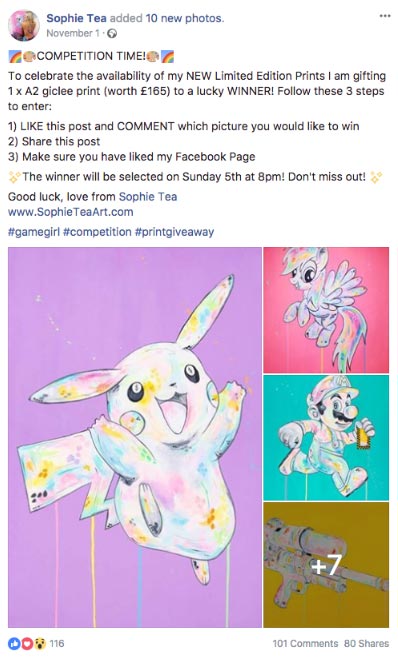How Facebook’s move to stop “Engagement Bait” could be detrimental to SMEs
How Facebook’s move to stop “Engagement Bait” could be detrimental to SMEs
“Tag a mate who does this…”
“Like and share for your chance to win…”
“Comment “YES” if you agree!…”
“Like for XYZ, Love for ABC…”
You know the type. The ever increasing “Clickbait” or “Engagement Bait” as Facebook has called it. It seems that my timeline is now full of posts of my friends being tagged in certain pictures and videos purely because the post has told them to.
And it is getting quite annoying.
Finally, though; Facebook has sat up and taken notice of this by announcing that they are going to be downgrading posts that use this method.
Facebook’s News Feed algorithm boosts the reach of posts based on the amount of engagement with them and Engagement Bait seeks to take advantage of this. The more people that react, share or comment on a post; the further the post will reach.
With this in mind, the news is great. Facebook have scanned and categorised hundreds of thousands of posts to inform machine learning to detect different types of Engagement Bait. The main idea behind all of this is to encourage the promotion of genuine, quality content across Facebook and to reduce the amount of “spammy” posting. Facebook explains:
Publishers and other businesses that use engagement bait tactics in their posts should expect their reach on these posts to decrease. Meanwhile, pages that repeatedly share engagement bait posts will see more significant drops in reach. Page admins should continue to focus on posting relevant and meaningful stories that do not use engagement bait tactics.
But what does this mean for social media marketing? Lot’s of businesses are using this method as a way of promoting their business and services in a genuine way through competitions and other forms of “tag a friend who is interested in this” kind of promotion.
Word of mouth marketing is extremely important to some businesses and encouraging this through asking people to like, share and tag people in the post provides a cheap, effective way of marketing that does provide value to those people that are involved in the posts.
While this change is encouraging the improvement of the quality of posts on Facebook and pushing the promotion of relevant, engaging content (for the right reasons) it is also potentially damaging to small businesses without the ability to push huge budgets into Facebook advertising. There is a very fine, blurry line separating this method of encouraging word of mouth marketing and becoming too “spammy” and now Facebook appear to be pushing this decision into the hands of an algorithm that will ultimately reduce the “Engagement Bait” but also slow down small business marketing techniques.
While you could always argue that businesses should be creating useful, relevant and engaging content to encourage sharing/reacting/commenting organically in the first place, is it really right to penalise business owners for being innovative?
The initial thought is that Facebook have a duty to protect the quality of the content on behalf of it’s 1.2 billion active users and this comes as a priority over protecting the interests of businesses using their platform for marketing purposes. But with this in mind, would that also then begin to push more businesses toward using paid advertising? Or is it time for businesses to have a think about new, more creative ways to interact with customers; potential and existing; on Facebook?
Sophie Tea, an Artist originally from the North-West uses this tactic occasionally in order to both promote her work and gain further exposure for her social media pages (Instagram and Facebook) in return for offering something (e.g. in this case a special edition print of her work) for the people that engage with it.

This isn’t on the same level as the “Spammy” examples that Facebook have used in their press release and it can be argued that in Sophie’s case, the offering is actually very clever: people are highly engaged because they have the chance to win a piece of Sophie’s work; and what Sophie get’s in return is a cheap piece of effective marketing (only costing her the sale value of the prints) with her post having a potential reach into the tens of thousands. – You can see that it gained 116 reactions, 101 comments and 80 shares – If Sophie had promoted this post through Facebook Advertising then it would have cost her quite a bit more on top of the cost of the prizes that she was giving away.
Interestingly, there are also companies that use this “Engagement Bait” methodology in conjunction with ads to artificially boost their reach. How will Facebook deal with this? Are they in the right place to start devaluing content that people are paying to be promoted? And if they don’t take the same stance for ad copy then is that creating a divide where the businesses who can afford advertising will get an unfair boost on their posts and those that don’t necessarily have larger budgets for ad spend will be penalised for more innovative marketing techniques?
While the move is to ultimately protect the content administered on Facebook, it is a platform that is utilised by people and businesses alike and this should be taken into consideration, especially for SMEs/sole traders in the market.
What would we suggest?
As a creative branding and marketing agency we believe that good quality content projects itself further than anything that has been manufactured for the sole purpose of engagement. Take a look into the types of content that you have created and publicised in the past and work out what has worked well, and what maybe hasn’t worked as well. You can use the Facebook Analytics tool to look through each post’s engagement separately including how many likes, comments and shares each post got. From here you can start to gauge what kinds of posts, media and topics are going to resonate best with your audience
In addition to this, we would also suggest that you keep in mind Facebook’s key News Feed values of Authenticity. Facebook explain that when ranking items to show in a user’s News Feed, friends and family come first. They also explain that through their own research they have found that people have two strong expectations when they go to their News Feed: To be informed and to be entertained.
They state:
We are not in the business of picking which issues the world should read about. We are in the business of connecting people and ideas — and matching people with the stories they find most meaningful. Our integrity depends on being inclusive of all perspectives and view points, and using ranking to connect people with the stories and sources they find the most meaningful and engaging.
With this in mind it is important that your engagement on Facebook is done so in a way that satisfies this mentality and not purely there to increase the number of likes and reach your business page commands.
